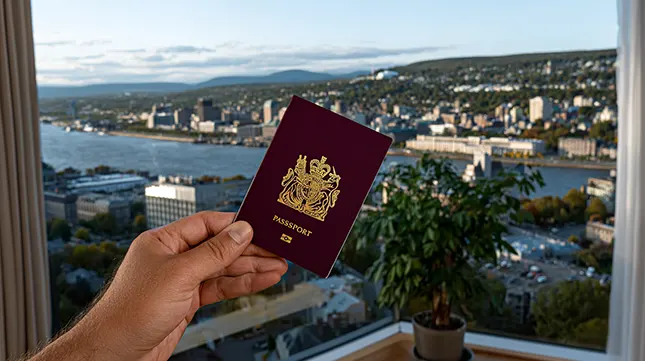Moving to Canada from UK – A Complete How to Guide

Moving to Canada from the UK is more than just a change of scenery, it’s the beginning of an exciting new chapter filled with opportunity, adventure, and the promise of a better lifestyle.
Think snow-capped mountains, bustling multicultural cities, peaceful lakeside towns, and wide-open landscapes that stretch as far as the eye can see. Canada isn’t just vast in size, it’s vast in what it offers too.
For many Brits, the appeal lies in more than the postcard-perfect views, for others, Canada’s world-class healthcare, strong economy, high standard of living, and welcoming, diverse population make it one of the most attractive countries in the world for expats.
Whether you’re chasing career growth, a better work-life balance, or simply craving a fresh start, Canada is well worth considering.
That said, uprooting your life and moving across the Atlantic is no small feat. It takes solid planning, careful research, and a clear understanding of what’s required to make your dream a reality.
In this comprehensive guide, we’ll walk you through everything you need to know to make the move from the UK to Canada with confidence — from visas and costs to settling in and making the most of your new home.
Let’s get started.
Why So Many Brits Are Choosing Canada
Canada continues to top global charts for quality of life, and it’s not hard to see why.
With a thriving economy, a strong focus on family and community, low crime rates, and outstanding public services, it’s no wonder thousands of Brits are leaping the Atlantic.
One of Canada’s most significant selling points is its reputation for friendliness and inclusivity. This is a country where diversity is not just accepted, it is positively celebrated.
Whether you’re relocating as a young professional, a family with children, or a retiree seeking space and peace, you’ll find a welcoming atmosphere and support to help you settle in.
From the cosmopolitan energy of Toronto to the coastal cool of Vancouver and the cultural fusion of Montreal, every Canadian city offers its own unique charm.
The key is finding the place that feels most like home, and in Canada, you’ll be spoiled for choice.

Explore the most common visa routes to move to Canada from the UK, including Express Entry, PNPs and family sponsorship.
Sorting out visas can be one of the most daunting parts of moving abroad and choosing the right one for you can be a minefield.
But here’s the good news: Canada has one of the world’s most flexible and forward-thinking immigration systems, and it’s actively looking to welcome over 360,000 new immigrants annually between 2025 and 2027.
There are over 100 different visa routes to Canada, and the one that is right for you depends on your specific circumstances. The most common routes include:
- Express Entry – Federal Skilled Worker Program (FSWP): This is a points-based system assessing factors such as age, education, language ability, and work experience. Ideal for skilled workers.
- Provincial Nominee Programs (PNPs): Each province has its own immigration streams tailored to meet local labour market needs. For example, Alberta often targets trades and engineering roles.
- Family Sponsorship: If you have a relative who’s already a Canadian citizen or permanent resident, they may be able to sponsor your application.
You’ll need to prepare supporting documents like valid passports, birth certificates, proof of funds, and possibly results from a language test such as IELTS.
Getting this stage right is vital, so consider seeking advice from a registered immigration consultant or legal advisor if you’re unsure.
Why Hiring an Immigration Agent Can Make All the Difference

Professional immigration agents simplify the process, boost your success rate and ensure your visa application is complete and correct.
Few could argue that navigating the visa process in most global locations is the reason many fail at the first hurdle.
Canada’s immigration system can be a stumbling block of forms, documents, and shifting rules. However, help is at hand. If you’re feeling overwhelmed by it all, you’re not alone, and this is where a qualified immigration agent can be a game-changer.
Immigration agents are trained professionals who specialise in Canadian visa applications.
They’re all over the latest immigration laws, know the red tape inside out, and can guide you toward the best visa route for your specific situation, whether that’s Express Entry, family sponsorship, or one of the business and entrepreneur pathways.
Their role doesn’t stop at simply filling out forms. A good agent will help you gather the correct documents, avoid costly mistakes, prep for interviews, and handle any complications that crop up along the way.
While you can apply on your own, using a professional can streamline the entire process, save you time, and reduce the stress of going it alone.
And most importantly, it can boost your chances of securing that all-important visa.
Becoming a Canadian Citizen: How to Make It Official
So, you’ve landed in Canada, fallen in love with the lifestyle, and now you’re ready to call it home for good. Fantastic, well done!
Gaining Canadian citizenship is the final step in making your new life official, and while there’s a process to follow, it’s absolutely achievable with the right preparation.
To qualify, you’ll need to be a permanent resident and have lived in Canada for at least three out of the last five years.
During that time, you must have filed your taxes, as this forms part of your citizenship application.
You’ll also need to show that you can speak either English or French, and pass a citizenship test covering Canada’s history, government, and core values.
If everything is in order, you can apply online; it’s a straightforward process if your paperwork is complete and accurate.
You may be asked to provide fingerprints for a background check. Still, if all goes well, you’ll be invited to attend a citizenship ceremony where you’ll take the Oath of Citizenship, a proud moment that officially welcomes you as a Canadian.
For full eligibility details and to start your application, visit the Government of Canada website.
Finding Work in Canada: How to Land a Job That Fits

Use Canadian job boards and networking platforms like LinkedIn to access roles and increase your hiring potential.
Securing employment is one of the most important steps in settling into life in Canada.
Thankfully, the Canadian job market is thriving in many sectors, but securing a position requires more than just submitting a CV.
Start by checking out trusted platforms like Indeed Canada and Monster Canada.
These sites offer thousands of listings across industries, and you can filter by location, salary, and job type to find something that suits your skills.
Set up job alerts and keep your profile updated to stay ahead of new openings.
But here’s the key difference: networking is everything in Canada. A well-crafted LinkedIn profile isn’t just a nice-to-have; it’s absolutely essential.
Join industry-specific groups, comment on posts, and connect with professionals in your field.
Many job opportunities never make it to job boards; instead, they are found through word of mouth or internal referrals.
You can also build visibility by attending virtual events, webinars, and industry conferences, even before you arrive.
Once in Canada, explore local chambers of commerce and professional associations, which often host exclusive networking events, mentorship programmes, and job fairs tailored to new arrivals.
A little proactive effort goes a long way in landing the proper role and opening doors to long-term success in your Canadian journey.
It also helps to keep informed.
In-demand skills for Canada change regularly. Visit the edstellar website to see the 10 most in-demand skills currently needed in Canada in 2025.
Getting Your Qualifications Recognised in Canada
Before jumping into the Canadian job market, it’s essential to make sure your UK qualifications are recognised, this is especially important if you’re planning to work in regulated fields like healthcare, engineering, or teaching.
Canada takes professional standards seriously, and in many cases, you’ll need to undergo a credential assessment to prove your education and experience meet national requirements.
The best place to start is the Canadian Information Centre for International Credentials (CICIC).
They offer clear guidance on what’s required for your specific profession, including whether additional training, exams, or licences are needed.
Beyond that, tailoring your CV and cover letter to match Canadian expectations can make a huge difference. Canadian employers prefer concise, achievement-focused documents that clearly show how your experience aligns with the role.
If possible, connect with a Canadian career advisor or make use of free online tools to fine-tune your application.
And don’t forget to prep for interviews, brush up on company culture, workplace etiquette, and common questions to boost your confidence and leave a strong impression.
Taking the time to validate your credentials and polish your approach could be what sets you apart in a competitive market and fast-tracks your path to a rewarding career in Canada.
Schooling in Canada: What Parents Need to Know Before the Move

Canada offers high-quality, province-led education for children and globally recognised universities for international students.
Relocating with children? It is always a challenge when you are considering such a big move with little ones in tow.
Education will be one of your top priorities, and the good news is that Canada’s education system is world-class and consistently ranks among the best globally.
Schooling is mandatory for children aged 6 to 18, and each province manages its own curriculum and standards.
Public schools are free to attend for residents and offer a high-quality education that rivals (and often outperforms) the UK system.
For example, if you’re moving to Ontario, you can explore what’s on offer through the Ontario Ministry of Education. Similarly, each province offers its own guidance and school finder tools.
Thinking long-term? Canada’s universities are globally recognised for academic excellence.
Institutions such as the University of British Columbia and the University of Toronto offer a vast range of undergraduate and postgraduate programs.
For more career-focused training, Seneca College and other polytechnics offer hands-on learning in a wide range of fields, from business to biotechnology.
Families seeking international schools will find good options in major cities. Annual tuition fees for international students typically range between CAD $20,000–$40,000 (roughly £11,000–£22,500), depending on the school.
Canada also offers excellent support for international students, including work visa pathways after graduation, through resources such as UBC International Students and McGill’s International Office.
From nursery-level early childhood education (ECE) to top-tier universities, Canada provides a well-structured and accessible learning journey. For many families, it’s a clear step up from what’s available in the UK.
Canada’s Economic Outlook in 2025: Resilient, Evolving, and Full of Potential
Canada continues to hold its ground as one of the world’s strongest and most stable economies, driven by a powerful combination of natural resources, innovation, and a thriving service sector.
As of 2024, Economics Insider ranked Canada 9th among the world’s largest economies, just behind the UK at 6th place.
Key sectors, including finance, energy, technology, and resource extraction (such as timber, oil, and minerals), form the backbone of this economic strength.
While 2024/5 has presented challenges, including a slower growth rate caused by rising interest rates, Canada is actively transitioning toward a more digitally focused and sustainable economy.
There’s a growing emphasis on industries like green technology, fintech, and e-commerce, all of which are opening new doors for skilled migrants and investors.
The second half of 2025 is expected to bring economic recovery, buoyed by government support and strategic investments in innovation and infrastructure.
In short, Canada’s economy isn’t just stable, it’s forward-thinking. For professionals, entrepreneurs, and families alike, it remains a land of opportunity.
For detailed forecasts, check out Oxford Economics.
Getting the Best Currency Exchange: CAD to GBP Tips for Homebuyers
If you’re moving to Canada and planning to buy a property, understanding the CAD to GBP exchange rate could save you thousands.
Currency values fluctuate daily, so timing your transfer can significantly impact your overall budget.
Many people default to using their bank, but that’s not always the most cost-effective option. Specialist foreign exchange (FX) firms, like Halo Financial, offer several key advantages:
- Better Rates – FX providers typically offer more competitive exchange rates than traditional banks.
- Lower Fees – You’ll often pay less in transfer costs, helping your money go further.
- Personalised Guidance – FX firms provide market insights and custom strategies so you can transfer funds when the rate is in your favour.
- Faster Transfers – These services are designed for speed, often completing transactions faster and more efficiently than banks.
If you’re transferring a large lump sum, say for a property purchase, immigration fund, or investment, working with an FX specialist ensures you get the best possible value and more peace of mind.
Setting Up Your Finances: Banking in Canada Made Easy

Open a Canadian bank account in advance and prepare for financial requirements like proof of funds and customs declarations.
Before your big move, one of the smartest steps you can take is getting your Canadian banking sorted in advance.
Canada is home to one of the most secure and trusted banking systems in the world, with major institutions like the Royal Bank of Canada, Toronto-Dominion Bank, and Bank of Montreal all ranked among the world’s top financial providers.
Opening a Canadian bank account before you arrive can make life a lot easier. It not only allows you to manage finances from day one but also serves as proof of funds, a crucial requirement for some visa categories.
Many banks now allow non-residents to open accounts online ahead of their arrival. For a handy step-by-step guide, check out PocketPence.
Just one important heads-up: if you’re travelling with more than CAD $10,000 (£5,415), you must declare it to the Canada Border Services Agency (CBSA) upon entry. Failing to do so could lead to confiscation.
Sorting your finances early helps smooth your transition, giving you more time to focus on settling in and exploring your new life in Canada.
Renting First in Canada: A Smart Start to Your New Life

Renting short-term allows flexibility while exploring Canadian cities and finding the right place to settle.
Even if buying a home is the long-term goal, starting out by renting in Canada is often the wisest move, especially while you’re still getting to know your surroundings.
Renting gives you the freedom to explore different neighbourhoods, towns, and provinces without being tied down.
Whether you’re drawn to the buzz of Toronto and Vancouver or prefer the slower pace of smaller towns like Kingston or Moncton, it pays to test the waters before committing to a location.
Finding rental properties is straightforward. Check out Realtor.ca or PadMapper for listings, or browse local classifieds and Facebook groups.
Most landlords will ask for proof of income or a credit check, but many are open to newcomers and understand the unique situation of recent arrivals.
Rental costs vary by city. For example:
- In Ottawa, expect to pay around C$2,006 (£1,086) for a one-bedroom flat in the city centre, or C$1,765 (£955) outside it.
- In Montreal, rents are more affordable at roughly C$1,698 (£919) centrally, and C$1,356 (£734) in the suburbs.
You can keep up-to-date with rental costs by visiting the Numbeo website. If you know where in Canada you will be living, you can break down the cost’s province by province.
Renting gives you breathing room to get familiar with Canadian life and find a neighbourhood that truly fits your needs. Take this time to settle in, explore, and decide where you really want to put down roots.
Buying a Home in Canada: What You Need to Know in 2025

Understand Canada’s homebuying process and key costs, from land transfer taxes to getting pre-approved for a mortgage.
Found your perfect Canadian city or town? Now it’s time to dive into the property market, and whether you’re already a permanent resident or planning to become one, Canada offers several financing options tailored to your status.
Buying a home here isn’t wildly different from the UK, but there are a few local quirks.
That’s where a registered Canadian realtor is worth their weight in gold. A good agent will guide you through every step, from spotting market trends to negotiating offers and handling legal paperwork.
You can browse verified listings and find trusted agents on Realtor.ca.
Expect to pay additional costs such as legal fees, notary services, land transfer taxes, and closing costs, all of which should be factored into your budget early.
Top tip: Get pre-approved for a mortgage before you start viewing homes. This shows sellers you’re serious and can help speed up the buying process in Canada’s competitive market.
For the full lowdown, check out the Government of Canada’s home-buying guide. With the right support and planning, your Canadian homeownership dream is well within reach.
Canada’s Progressive Employment Landscape

Canadian work culture values balance, diversity, and career development — with strong legal protections for employees.
Canada’s work culture is about more than just earning a living; it’s about striking a balance between career success and personal well-being.
When you join the Canadian workforce, you gain access to benefits like the Canada Pension Plan, Employment Insurance, paid parental leave, and often coverage for eye exams, depending on your province and employer.
Labour laws here are strict on health and safety standards, ensuring that your workplace is secure and supportive.
Additionally, most employees enjoy around 10 statutory public holidays, with some provinces offering even more, as well as generous annual leave allowances.
Canada also stands out for its diverse, multicultural workplaces, where inclusivity and collaboration are encouraged across every sector, from healthcare and education to finance and tech.
If you’re looking to grow your career, Canada has your back, with strong professional development networks, mentorship opportunities, and access to government support programs for newcomers.
For detailed information about your rights and benefits, visit Employment and Social Development Canada.
Pro tip: Embrace diversity in your new workplace, it’s one of Canada’s greatest strengths, and it can open doors to ideas, contacts, and career moves you never expected.
Understanding Canadian Taxes in 2025: A Newcomer’s Guide
Taxes may not be the most exciting part of your move, but understanding them is essential for a smooth financial start in Canada.
Canada operates a progressive tax system, much like the UK.
It’s administered by the Canada Revenue Agency (CRA), and your first year as a newcomer comes with special tax considerations.
You’ll need to declare your worldwide income and may be eligible for certain tax credits or deductions based on your arrival date and status.
Here are the 2025 federal income tax brackets:
- Up to $55,867 – taxed at 15%
- $55,867 to $111,733 – taxed at 20.5%
- $111,733 to $173,205 – taxed at 26%
- $173,205 to $246,752 – taxed at 29%
- Over $246,752 – taxed at 33%
In addition to federal tax, each province levies its own provincial income tax, also based on a progressive scale.
For example, Ontario, Alberta, and British Columbia all have different provincial rates and thresholds, so where you live can make a real difference to your take-home pay.
You’ll need to file an annual return each spring, and while it’s possible to do this yourself, many newcomers find value in working with a local tax advisor, especially during their first year.
For tools, calculators, and advice, visit the CRA website to get started.
Experiencing Canada’s Seasons: From Snowfall to Sunshine

Canada’s four seasons offer everything from snowy ski resorts to long, sunny summer days and stunning autumn colours.
Arrivals from the UK will find Canada’s climate more extreme, but it’s also one of the most magical parts of life here.
With its vast size, Canada offers a diverse range of weather experiences across its regions, allowing you to enjoy all four seasons truly.
Winter (December to February) is a snowy wonderland, perfect for skiing, snowboarding, and curling up by the fire.
Top resorts like Whistler attract snow lovers from all over the world.
If freezing temperatures aren’t your thing, opt for British Columbia, where winters are noticeably milder.
Southern Alberta experiences warm Chinook winds, providing relief from the chill.
Summer (June to August) brings long, hot days, and in cities like Whitehorse, Dawson City, and Edmonton, the Midnight Sun phenomenon provides up to 20 hours of daylight.
Spring and autumn are mild, beautiful seasons, perfect for hiking, camping, and whale watching. Canadians take full advantage of the great outdoors when the weather is just right.
But be warned! Canadian weather can change in an instant. A sunny afternoon might turn rainy without warning.
To stay ahead of the elements, check Environment Canada’s weather updates for accurate, real-time forecasts.
Driving in Canada: What UK Expats Need to Know

Get familiar with Canada’s road rules, licence exchange requirements, and the differences from UK driving norms.
If you’re planning to drive in Canada, you can expect a few adjustments, but nothing too daunting.
Most provinces recognise UK driving licences, especially during the early stages of your residency. Still, it’s smart to check the rules where you’re heading.
In Alberta, for example, you’ll need to exchange your UK licence and prove at least two years of driving experience.
A few key changes to note:
- Canadians drive on the right-hand side.
- Speed is measured in kilometres per hour (KPH).
- Most cars are automatic.
- You can turn right at red lights unless otherwise posted.
- Emergency services are reached by dialling 911 anywhere in the country.
Canada’s roads are generally in excellent condition, and driving here is one of the best ways to explore its epic scenery, from rugged coastlines to pristine national parks.
Voting as a UK Citizen Living in Canada
Just because you’ve moved abroad doesn’t mean you lose your right to have a say back home.
British expats living in Canada can still vote in UK elections, thanks to the removal of the previous 15-year limit.
All you need to do is register as an overseas voter. It’s quick and easy to do online, and you can vote by post, proxy, or even in person if you happen to be visiting the UK at the time of an election.
As for voting in Canada, you’ll need to be a Canadian citizen aged 18 or older.
Permanent residents aren’t eligible to vote until they’ve completed the citizenship process, which includes meeting residency requirements and passing a citizenship test.
To keep your voice heard in UK politics, head over to the UK Government’s overseas voting registration page and get signed up.
Retiring in Canada: What UK Expats Need to Know
Planning to retire in Canada? Great choice, but it’s essential to understand how your UK and Canadian pensions will work together.
You can continue receiving your UK State Pension while living in Canada.
However, the UK government does not uprate (increase) your pension annually once you’re overseas, meaning your payments will be frozen at the rate they were when you first claimed them.
This is due to the lack of a current social security agreement between the UK and Canada.
To receive your UK pension abroad, you’ll need to provide details such as your previous UK addresses, employment history, and a Canadian bank account for payments.
Canada’s Canada Pension Plan (CPP) can also support you during retirement. You can apply from age 60 and continue contributing until age 70 to increase your monthly amount.
Making voluntary contributions while you’re still working may also boost your retirement income.
Managing both pension systems can be tricky, so it’s wise to consult a cross-border financial adviser to ensure you’re not missing out on tax benefits, credits, or valuable income.
Living Life to the Full: Canada’s Endless Leisure and Cultural Delights

Enjoy the outdoors, vibrant festivals, museums and diverse cultural events that make life in Canada so rewarding.
Whether you’re drawn to the great outdoors or immersed in cultural pursuits, Canada is bursting with experiences to enjoy, and you’ll never run out of things to see or do.
Love nature? Picture yourself canoeing through Algonquin Park, hiking the Rockies, or skiing in Banff, all postcard-perfect backdrops for adventure seekers. Canada’s national and provincial parks offer world-class trails, wildlife encounters, and breathtaking views at every turn.
More into museums and the arts? The Canadian Museum of History offers a fascinating glimpse into Canada’s past, while the National Arts Centre in Ottawa presents top-tier music, dance, and theatre performances.
Then there are the festivals. Experience the thrill of the Calgary Stampede the self-proclaimed “Greatest Outdoor Show on Earth” or catch a red-carpet moment at the Toronto International Film Festival.
Every province offers its own flavour, from Nova Scotia’s maritime charm to British Columbia’s wine country.
Canada doesn’t just give you space it gives you freedom to live fully.
Safety First: Why Canada Ranks Among the World’s Safest Countries
When you imagine life in Canada, you might picture towering mountains and welcoming neighbours and you’d be spot on. But Canada is more than just scenic and friendly, it’s also one of the safest countries in the world.
According to the Global Peace Index, Canada consistently ranks among the top 10 for safety, thanks to its low crime rates, political stability, and a strong sense of community.
You’ll notice the difference straight away: residential areas without high fences or bars on windows, kids playing outside, and locals walking home after dark without fear. It’s a society built on mutual respect and trust.
Of course, crime can still occur, especially in larger cities, but Canada invests heavily in community-based policing, education, and social services aimed at tackling issues early and effectively.
For newcomers, this sense of safety and openness is often a huge factor in choosing Canada as a permanent home.
It’s not just safe by statistics — it feels safe in everyday life.
Settling In: Embrace Canadian Culture and Find Your Feet

Adapt to Canadian customs, learn some French phrases, and build your community through volunteering and local events.
Moving to Canada from the UK is a bold and exciting step but, it’s perfectly normal to have moments of doubt along the way. New surroundings, unfamiliar customs, and even small daily routines can take some getting used to.
Give yourself permission to adjust at your own pace.
Canada is a welcoming and multicultural country, and you’ll quickly find your place if you lean in with curiosity and an open mind.
While English is spoken throughout most of Canada, French is also widely used, especially in Quebec.
Learning a few simple French phrases can go a long way in helping you connect with locals and show your enthusiasm for Canadian life.
Politeness and punctuality are big cultural values here, so showing up on time and offering a friendly smile will go far.
Don’t be afraid to get involved in community events or volunteer locally, it’s one of the fastest ways to make new friends and feel like you belong.
Celebrations like Victoria Day and Canada Day are great opportunities to learn more about Canadian traditions — and they’re fun, too!
For more on how to settle in with confidence, check out the Government of Canada’s Newcomer Guide.
Emergency Services in Canada: What Expats Should Know
In Canada, 911 is the nationwide number for all emergency services, including police, fire, and ambulance. It’s fast, reliable, and available 24/7 but there’s one key difference newcomers need to be aware of.
While police and fire services are publicly funded, ambulance services may come with a fee, depending on your location and the nature of the call-out.
For example:
- In Toronto, medically necessary ambulance trips may require a co-payment of around C$45, but that can jump to C$240 or more if the transport isn’t deemed essential.
- In Alberta, ambulance rides can cost upwards of C$385.
These fees are not always fully covered by provincial healthcare plans, so it’s worth checking your health insurance policy before you move.
Some provinces offer reduced rates for seniors, low-income residents, or those with supplemental private insurance.
To avoid surprises, visit your provincial health ministry website for local fee structures and emergency guidance.
Being prepared doesn’t just mean knowing who to call it means knowing what to expect when help arrives.
Final Thoughts: Starting Your New Life in Canada
Moving to Canada from the UK is no small feat; it’s one of the most rewarding decisions you can make.
Whether you’re drawn by the career opportunities, the stunning natural landscapes, the high standard of living, or the inclusive culture, Canada offers a fresh start filled with promise and possibility.
Of course, international relocation comes with its fair share of challenges, from paperwork and planning to adjusting to a new environment.
With the right preparation and support, you can turn those hurdles into stepping stones.
At White & Company, we’ve helped thousands of people take the leap and start a new life in Canada, and we’re ready to do the same for you.
From trusted packing services and storage to expert international shipping, we’re here to make sure your move is as smooth and stress-free as possible.
If you’re ready to embrace everything Canada has to offer, let’s get started. Your new life is waiting!
Let White & Company Move You to Canada — Stress-Free!

Let White & Company take the stress out of your international move so you can focus on the excitement ahead.
With over 150 years of experience, we know exactly what it takes to get your belongings safely from the UK to Canada.
As trusted members of BAR, FIDI, and OMNI, we meet the highest standards in global removals so you can trust us with everything from your fine china to your furniture.
Our friendly teams across the UK will carefully pack your items, handle all the logistics, and make sure everything arrives in Canada ready for your new adventure.
We offer flexible options to suit your needs, whether you’d prefer a home visit, video survey, or online chat with our Bot.
Getting started is easy just fill out our quick quote form or give us a call.
Get your free no obligation quote today and take the first step toward your new life in the Great White North!

Max is a seasoned writer and blogger in the real estate and home moving sectors, as well as a knowledgeable source of information for expatriates living and working abroad. His detailed insights have helped thousands of people move and live abroad with greater simplicity and ease.
Posted in: News
Leave a Comment (0) ↓


